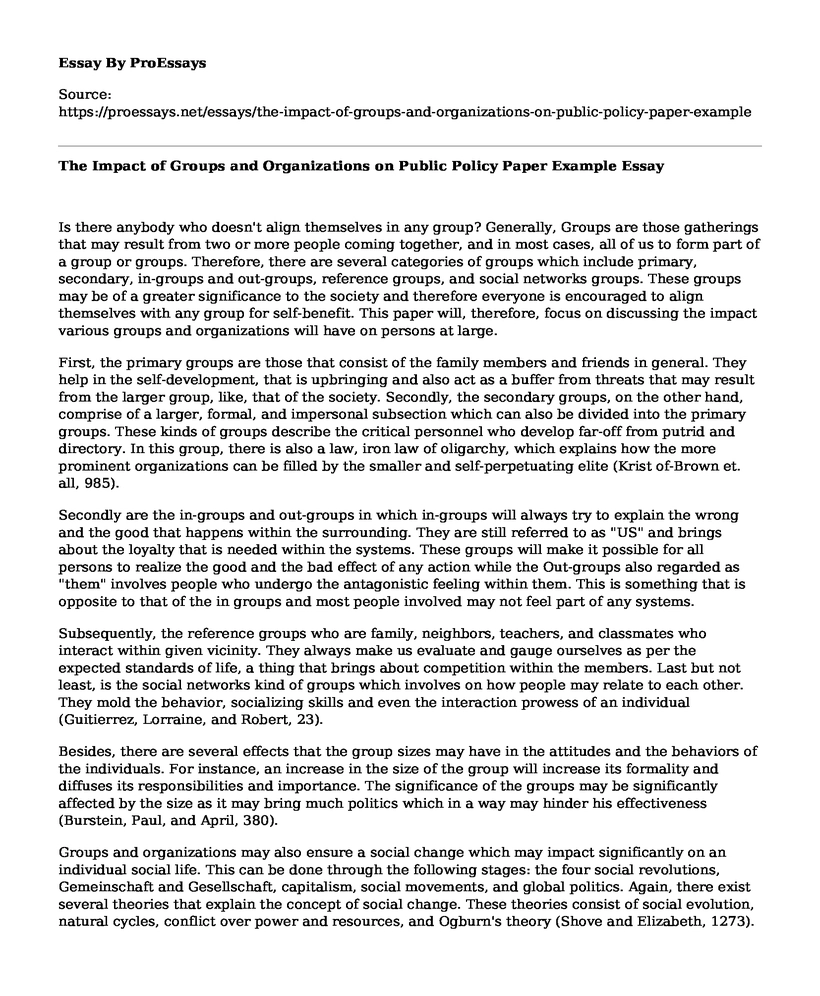Is there anybody who doesn't align themselves in any group? Generally, Groups are those gatherings that may result from two or more people coming together, and in most cases, all of us to form part of a group or groups. Therefore, there are several categories of groups which include primary, secondary, in-groups and out-groups, reference groups, and social networks groups. These groups may be of a greater significance to the society and therefore everyone is encouraged to align themselves with any group for self-benefit. This paper will, therefore, focus on discussing the impact various groups and organizations will have on persons at large.
First, the primary groups are those that consist of the family members and friends in general. They help in the self-development, that is upbringing and also act as a buffer from threats that may result from the larger group, like, that of the society. Secondly, the secondary groups, on the other hand, comprise of a larger, formal, and impersonal subsection which can also be divided into the primary groups. These kinds of groups describe the critical personnel who develop far-off from putrid and directory. In this group, there is also a law, iron law of oligarchy, which explains how the more prominent organizations can be filled by the smaller and self-perpetuating elite (Krist of-Brown et. all, 985).
Secondly are the in-groups and out-groups in which in-groups will always try to explain the wrong and the good that happens within the surrounding. They are still referred to as "US" and brings about the loyalty that is needed within the systems. These groups will make it possible for all persons to realize the good and the bad effect of any action while the Out-groups also regarded as "them" involves people who undergo the antagonistic feeling within them. This is something that is opposite to that of the in groups and most people involved may not feel part of any systems.
Subsequently, the reference groups who are family, neighbors, teachers, and classmates who interact within given vicinity. They always make us evaluate and gauge ourselves as per the expected standards of life, a thing that brings about competition within the members. Last but not least, is the social networks kind of groups which involves on how people may relate to each other. They mold the behavior, socializing skills and even the interaction prowess of an individual (Guitierrez, Lorraine, and Robert, 23).
Besides, there are several effects that the group sizes may have in the attitudes and the behaviors of the individuals. For instance, an increase in the size of the group will increase its formality and diffuses its responsibilities and importance. The significance of the groups may be significantly affected by the size as it may bring much politics which in a way may hinder his effectiveness (Burstein, Paul, and April, 380).
Groups and organizations may also ensure a social change which may impact significantly on an individual social life. This can be done through the following stages: the four social revolutions, Gemeinschaft and Gesellschaft, capitalism, social movements, and global politics. Again, there exist several theories that explain the concept of social change. These theories consist of social evolution, natural cycles, conflict over power and resources, and Ogburn's theory (Shove and Elizabeth, 1273).
Conclusion
In conclusion, groups may be of significance to the society depending on which kind of group one may choose to be. It is therefore encouraged to everyone to associate themselves with a given group for if used correctly, may propel one to the highest level of life.
References
Burstein, Paul, and April Linton. "The impact of political parties, interest groups, and social movement organizations on public policy: Some recent evidence and theoretical concerns." Social Forces 81.2 (2002): 380-408.
Guitierrez, Lorraine M., and Robert Ortega. "Developing methods to empower Latinos: The importance of groups." Social Work with Groups 14.2 (1991): 23-43.
Kristof-Brown, Amy L., Karen J. Jansen, and Amy E. Colbert. "A policy-capturing study of the simultaneous effects of fit with jobs, groups, and organizations." Journal of Applied Psychology 87.5 (2002): 985.
Shove, Elizabeth. "Beyond the ABC: climate change policy and theories of social change." Environment and Planning A 42.6 (2010): 1273-1285.
Cite this page
The Impact of Groups and Organizations on Public Policy Paper Example. (2022, Nov 06). Retrieved from https://proessays.net/essays/the-impact-of-groups-and-organizations-on-public-policy-paper-example
If you are the original author of this essay and no longer wish to have it published on the ProEssays website, please click below to request its removal:
- Imperialism in Conrad's Heart of Darkness and Its Relevance Today
- Zhejiang Village Analysis Essay
- Our Democracy Has Failed and No Longer Represents the People - Paper Example
- Power of Governors in Public Policy - Research Paper
- The Govt's Role in Stabilizing the Global Economy: A Look Back at 2008 - Essay Sample
- Essay Example on Klu Klun Klan: Indy Newspaper's Crusade for Democracy
- Essay on Urban Governance: Examining Diffuse Authority & Unspoken Conventions







